Dir. MilosForman. UK-Sp. 2006.114mins.
Director Milos Forman and producerSaul Zaentz reteam for thefirst time since the Oscar-winning Amadeus(1984) with Goya's Ghosts, a strongly crafted productionwhich effectively brings to life not only the revered painter Francisco Goyabut also the tumultuous period in which he lived.
Tightly-scriptedplotting (the film also reunites Forman and Valmontscreenwriter Jean-Claude Carriere), lavish design anda commendable performance from Javier Bardem combinewell in a feature that has enough twists in its plotting to keep audiencesengaged.
Goya is anational hero in Spain, where the film opens on Nov 8 following a massivepromotional campaign. There, audiences may prove to be somewhat more criticalthan in other territories of an icon's treatment at the hands of a Czechfilm-maker and a French writer, although the casting of local talent in keyroles should help. Certainly it should outpace lower-budget films featuring theartist, such as Bigas Luna's Volaverunt and Carlos Saura's Goya In Bordeaux, which opened within weeks of each other inSpain in 1999 (and each took less than $2m).
Box-officeprospects beyond Spain may account for more than the balance of the film'stheatrical returns. Aside from the billing of names such as Natalie Portman,Goya is known beyond home - in recent years he has been the subject of awell-received biography by Robert Hughes as well as a direct influence on thelatest generation of artists - and the amount of period detail should help ensurean audience beyond art buffs.
In Madrid in 1792the Inquisition holds much of the power, cracking down on anyanti-establishment ideas seeping in from the new republic of France. The youngand beautiful Ines (Portman), accused of practising Judaism after refusing to eat pork, is torturedand confesses her guilt. Her father Bilbatua (Gomez),a wealthy merchant, forces Lorenzo (Bardem), a monkand one of the Inquisition's most fearsome supporters, into signing aself-recriminatory confession, then uses it to appeal to the king (Quaid) and the artist Goya (Skarsgard),painter of Lorenzo's portrait.
When the documentis made public, Lorenzo flees - but Ines, now pregnantby the monk, is left to rot in jail.
Fifteen yearslater the French - under Napoleon - have "liberated" Madrid, expecting to bewelcomed as heroes, but are set upon by locals in scenes that form the basisfor some of Goya's most famous works (and which are successfullyrecreated here). Lorenzo now holds high position under King Joseph, brother ofNapoleon and new Spanish ruler, but is forced to flee when the English invade.
Meanwhile Ines, by now half mad and with most of her family dead, hasbeen released and starts searching for the child she gave birth to while injail. But her daughter (also played by Portman) has become an elegantprostitute, catering to the carriage trade on the Paseodel Prado.
The film endswith the execution of Lorenzo by strangulation. His inert body is thrown onto acart that is followed by Ines, still distraught and clutchinga baby abandoned in one of the street disturbances.
Even more thanForman's Amadeus, Goya's Ghosts is less about the artist in its title than those aroundhim. Goya is an observer of a key, tumultuous period in Spanish history, weavingin and out of the plot, as when he introduces Lorenzo to Ines;or when he attends the dinner at which Lorenzo is forced to sign a "confession";or when he sketches Lorenzo's execution.
While Goya's paintings are famed worldwide, their historical contextis less well known. The screenplay wisely keeps the story fairly simple,concentrating on the artist's embroilments with other characters, although someaudiences may wince at certain historical cliches, including an Inquisitionwhich owes more to Edgar Allan Poe than historical reality.
Javier Bardem is always riveting as the twisted opportunisticmonk, despite speaking heavily accented English in the film's English-language version,and ably carries the weight of the story. Fine support comes from Stellan Skarsgard as Goya, asympathetic and humane observer of the horrors around him, although the scenein which he suddenly finds himself totally deaf verges on the histrionic.
Natalie Portmansuccessfully applies herself to multiple parts, first as an innocent beauty,then as a desperate prisoner and finally as a vivacious prostitute.
But Goya's Ghosts really shines on the technical front.Production design is lavish - the shoot used several of Spain's royal palaces -and recreates street scenes to winning effect, while costume design meshes withthe change of moods. Javier Aguirresarobe'sphotography is crisp and colourful and the editingpropels the narrative along briskly.
The only realtechnical flaw is a somewhat overpowering musical score which frequently grates,rising to absurd crescendos during certain key scenes.
Productioncompanies/backers
The Saul Zaentz Company
Xuxa Production
Kanzaman Films
Internationalsales
HanWay
Warner Bros Pictures International Espana
Executiveproducer
Paul Zaentz
Producer
Saul Zaentz
Co-producers
Denise O'Dell
Mark Albela
Screenplay
Milos Forman
Jean-Claude Carriere
Cinematography
Javier Aguirresarobe
Production design
Partrizia von Brandenstein
Editor
Adam Boome
Music
Jose Nieto
Main cast
Javier Bardem
Natalie Portman
Stellan Skarsgard
Randy Quaid
Jose Luis Gomez
Michael Lonsdale





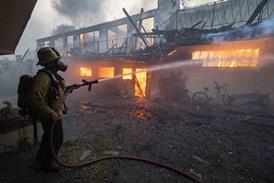
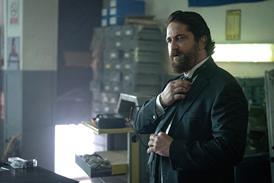



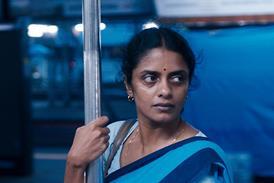




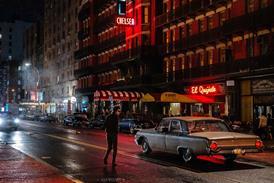

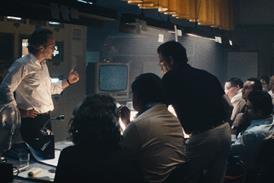

No comments yet